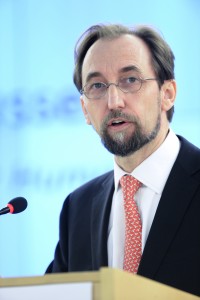
In his opening address to the 28th session of the Human Rights Council in Geneva, the UN High Commissioner for Human Rights, Zeid Ra’ad Al Hussein, called upon representatives to display ‘profound and inspiring leadership’ to combat the challenges of discrimination and deprivation, and the address the conflicts and crises currently generating needless human suffering.
He challenged representatives to recognise that it is not the ratifying of international treaties, seeking places on committees, and making statements on the floor of the Council that is the real measure of the State; but rather the adherence to respect for the human rights of all – justice, education, equality and permanent peace.
The High Commissioner referred to the underlying principles of the UN Charter, and linked to that seminal text, the multitude of elaborative treaties establishing as binding law, the legal principles of human rights. He identified three principle areas for specific attention: human rights abuses consequent upon deprivation and discrimination; States ‘principled’ response to terrorism, and respect for international whistleblowers, namely independent experts and civil society.
Addressing the roots of human rights abuses, His Excellency identified deprivation and discrimination as being the result of policy choices limiting ‘freedom and participation’, and creating ‘obstacles to the fair sharing of resources and opportunities’. These, he noted, are entrenched and condoned courses of action designed to benefit the elites to the detriment of the poor and powerless. While some evidence of discrimination and deprivation may be hidden, for the most part, it is there for all to see. It is the face of the State and its reputation. Against this, it is for the State to prevent abuses, address social inequalities, and uphold the dignity of its people.
He noted how international humanitarian law and international human rights law define Member States’ necessary response to the scourge of terrorism. He emphasized the universality, interdependence and indivisibility of all human rights, and rejected the attitude that exceptional circumstances permit situational selectivity of rights; that inherent rights may be denied to some because of perceived new threats; and that the challenges of terrorism, globalisation and migration justify overturning the legal foundations established by human rights conventions. He decried the hypocrisy of denial of intra-national rights while proclaiming the defence of international rights.
Special concern was expressed regarding the ‘contempt and disregard’ shown towards the Council’s appointed independent experts, and to ‘reprisals and smear campaigns’ targeting members of civil society engaging with the Human Rights Council. The High Commissioner appealed for focus on the substance of complaints rather than on the critic.